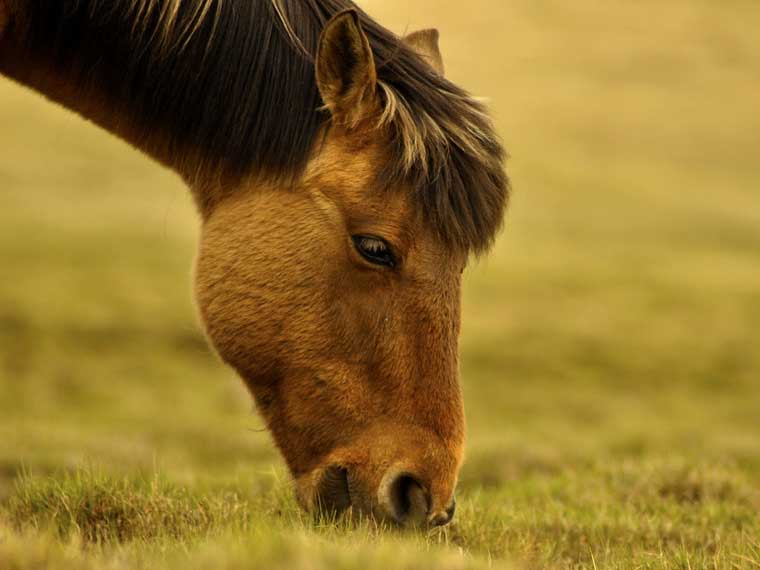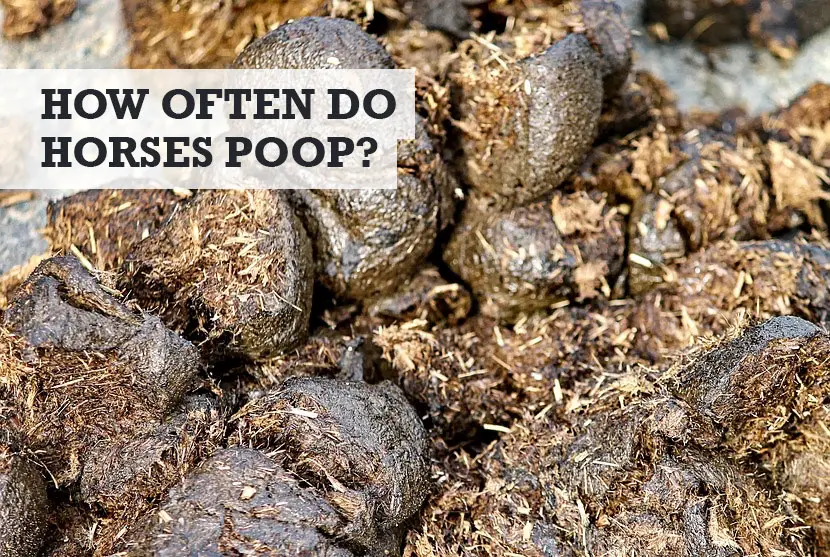As a prospective horse owner there are lots of considerations to take before you buy. One thing that might get overlooked is how much poop a horse produces in a day. After all, when you gotta go, you gotta go, and horses go a lot! But exactly how often do horses poop per day and how much can you expect?
How much do horses poop? The average horse can poop up to twelve times a day, leaving behind approximately 50 pounds of poop. That equates to 18,250 pounds of poop a year!
This may sound unpleasant to a lot of people, but horse manure has proven to be a reliable source for monitoring a horse’s health. It also makes for a wonderful fertilizer!
There is much to understand about an equine’s droppings, but I have all the information you need to become a horse poop expert (how’s that for your resume?).
Read on to learn about the journey of feed through a horse’s body, the tell-tale signs of illness found in manure, and how you can use it to spruce up your garden.

How long does it take a horse to poop after eating?
You can expect a horse to poop anywhere between 36 and 72 hours after eating according to the Hygain website:
The main function of the small colon is to reclaim excess moisture and return it to the body. This results in faecal balls being formed. These faecal balls, which are the undigested and mostly indigestible portion of what was fed some 36-72 hours ago are then passed to the rectum and expelled as manure through the anus.
How can you tell if a horse is constipated?
Signs that a horse is constipated can include:
- Hard, dry manure being passed infrequently.
- The horse make a big effort to poop.
- The poop is covered in mucous.
- No manure production.
- Unthrifty coat appearance.
- Rough, dry coat.
- Exercise intolerance.
- Depression.
- Lying down.
- Rolling on the ground.
- Pawing at the ground.
- Repeated looking at side or digestive region
How can I get my horse to poop?
There are a few things that vets recommend helping encourage constipated horse to poop. These ways include:
- Mineral oil as a laxative.
- Walk the horse to get the gastrointestinal system moving.
- Graze on fresh grass to get bowels moving.
If this doesn’t work, vets can give horses different therapy and in more serious cases, surgery, to help them get pooping again.
What is a natural laxative for horses?
There are a number of natural laxative ideas on the Paulick Report website, including
- Dandelion
- Valerian root
- Chamomile
- Meadowsweet
- Peppermint
How horse poop is produced
A horse’s meal has a long way to go before it becomes our topic of conversation. As soon as a horse starts chewing, saliva mixes with the feed to make it easier to swallow. Saliva also helps neutralize stomach acids by providing a buffer, which aids the digestion process.
Once swallowed, the food travels into the stomach. Horses digest very quickly, so the food will spend around 15 minutes here being liquified and moving along to the small intestine.
The feed’s time in the small intestine is one of the most important stages of a horse’s digestion and takes approximately one to three hours. Essential nutrients are absorbed here including simple sugars, fats, protein, and soluble vitamins.
Next, food will travel into the large intestine where it will spend a majority of its journey through the horse’s body. It passes through the cecum (also known as the blind sac) and the large colon where energy is produced through the fermentation of fiber.
Now that all of the feed’s vitamins and nutrients have been extracted, it is absorbed by the small colon. Fecal balls are formed and will soon be ready to pass through the rectum.
A horse’s entire digestion process takes between 36 and 72 hours.
Determining healthy poops from unhealthy poops
Just like other creatures, including humans, a horse’s poop can reveal a lot about its current health status. In fact, it’s considered to be one of their vital signs.
Most horse owners and veterinarians assess a horse’s manure using a method called “The Three Cs.” The letters stand for:
- Color
- Consistency
- Control
I’ll dive into a brief explanation of each one to help you get started. Please keep in mind that this is not a one-size-fits-all method. The status of an equine’s poop can vary from horse to horse, and simple changes are often nothing to worry about.
Color
The color of a horse’s manure greatly depends on the type of feed they consume, but most of the time, it will have a shade of green.
Here is a look at what colors you can expect to see based on a horse’s feed:
- Vibrant green: alfalfa
- Light yellow: hay (low-quality hay can create a brownish color)
- Reddish/purplish brown: beet pulp
These colors could indicate something is wrong and you should visit a vet immediately:
- Red: If you haven’t fed your horse any beets lately, it could indicate blood in the stool.
- Yellow-coated: Do you see a yellowish mucus? It could be that the horse’s digestion process is delayed.
- Gray: Vegetable oil substitutes are commonly responsible for gray stool. Ask a vet if a change in diet is necessary.
- Black: This could be caused by gastrointestinal bleeding, but it’s rarely seen.
Consistency
The ideal consistency for horse manure is well-formed fecal balls that are moist, but not too wet. When they hit the ground, they should easily keep their shape.
Do you notice something different? These consistencies are signals that something could be wrong.
- Cowpie: This can be normal if the horse has been working hard or is stressed, but it could also mean there is trouble brewing in the GI tract.
- Liquid diarrhea: If the horse’s manure is unusually wet, it could indicate severe inflammation, a virus, or bacterial infection.
- Hard and dry: One of the first signs of dehydration. Drinking more water should easily resolve this problem, but make sure you act quickly so colic doesn’t happen.
- Gritty: Has the horse ingested sand recently? This is the main cause of gritty manure.
- Fibrous: Although this is not yet proven by science, many horse owners believe undigested food is a sign that the horse not thoroughly chewing its food.
Control
On average, horses defecate 10 times per day. You may notice that a horse poops much more often, but this is not necessarily a cause for alarm.
There are many reasons horses poop aside from typical defecation, and these are some of the most common:
- Social: If a horse is part of a herd, it may pass a pile as a way to say hello to its friends.
- Marking territory: This behavior is most prevalent in stallions. He may even leave his droppings on top of another horse’s manure.
- Age: As long as a foal drinks its mother’s milk, it will pass poop much more often.
If there are fewer manure piles than normal, your horse may not be eating enough. I recommend visiting your vet to make sure he is not sick. It could also mean the GI tract has slowed down, putting him at risk for colic.
A horse’s pooping process takes around 15 seconds. If it takes longer than this, it could be anything from a little gas to a physical obstruction. Be sure to visit your vet if the extended pooping time persists.
What’s that smell?
Utilizing ‘The Three Cs’ is a tried and true method for finding signs of illness in a horse’s manure, but you can also rely on the odor to reveal any issues that need medical attention.
A horse’s digestive system relies on bacteria in the GI tract to digest most of what they eat. If this bacteria is altered in any way, you’ll most likely know once you get a whiff of the horse’s droppings.
If you smell something like rotten meat, there could be too much protein in your horse’s diet or it’s having trouble absorbing nutrients. A sour smell is an indication of too many carbohydrates or parasites.
Horse poop as compost
Horse poop is one of the most inexpensive composts and a popular fertilizer in home gardens. The high number of nutrients and organic matter is slightly higher than that of cow manure, making it a highly-valued compost among farmers and gardeners alike.
If you’d like to treat your plants to a solid nutrition boost, horse compost is almost always available in rural areas and through reputable suppliers.
You can also make the fertilizer yourself should you have your own horses. Keep in mind that fresh manure shouldn’t be used on plants since it could burn the roots. The traditional composting method should work just fine.
You can turn any free-standing pile of droppings into an enriching soil additive without any special tools or structures. Just add enough water to keep the pile moist and turn it at least once a day. I also recommend covering the manure with a tarp to retain the necessary heat and keep the droppings from overdrying.
If done properly, you’ll have garden-ready fertilizer in approximately two to three months.
Conclusion
The amount that a horse will poop each day might have surprised you. If you are thinking about buying a horse you need to be prepared for how much poop you will be dealing with.
You might also like…
- The risks in keeping horses and donkeys together
- Why police horses wear visors
- What do horses do at night?
Image in header via https://pixabay.com/photos/horse-apples-horse-manure-nature-3369389/

